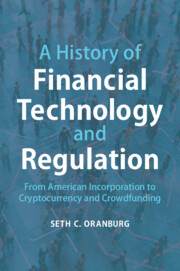 A History of Financial Technology and Regulation
A History of Financial Technology and Regulation from The Third Era
Published online by Cambridge University Press: 24 March 2022
While the previous Chapter explores the origins of cryptography and explains the functional features of Blockchain, this Chapter provides a robust discussion of the various legal challenges and arguments surrounding this novel technology. While self-regulating markets have some desirable aspects, the anonymous or pseudonymous feature of cryptocurrency has its drawbacks which can lead to more fraud and corruption if left completely unchecked. Primarily, this Chapter focuses on administrative law implications and addresses the question of who could (and should) regulate cryptocurrency markets. The answer depends on how digital assets are classified. For example, if the digital asset is labelled a security, it will fall under the regulatory authority of the SEC but will be limited by the Supreme Court’s decision in SEC v. Howey. Further, this Chapter analyzes the constitutional implications of cryptocurrency–do people have a constitutional right to privacy when making financial transactions? This Chapter discusses the various constitutional rights that may be implicated and the arguments that may be used in future litigation.
To save this book to your Kindle, first ensure [email protected] is added to your Approved Personal Document E-mail List under your Personal Document Settings on the Manage Your Content and Devices page of your Amazon account. Then enter the ‘name’ part of your Kindle email address below. Find out more about saving to your Kindle.
Note you can select to save to either the @free.kindle.com or @kindle.com variations. ‘@free.kindle.com’ emails are free but can only be saved to your device when it is connected to wi-fi. ‘@kindle.com’ emails can be delivered even when you are not connected to wi-fi, but note that service fees apply.
Find out more about the Kindle Personal Document Service.
To save content items to your account, please confirm that you agree to abide by our usage policies. If this is the first time you use this feature, you will be asked to authorise Cambridge Core to connect with your account. Find out more about saving content to Dropbox.
To save content items to your account, please confirm that you agree to abide by our usage policies. If this is the first time you use this feature, you will be asked to authorise Cambridge Core to connect with your account. Find out more about saving content to Google Drive.